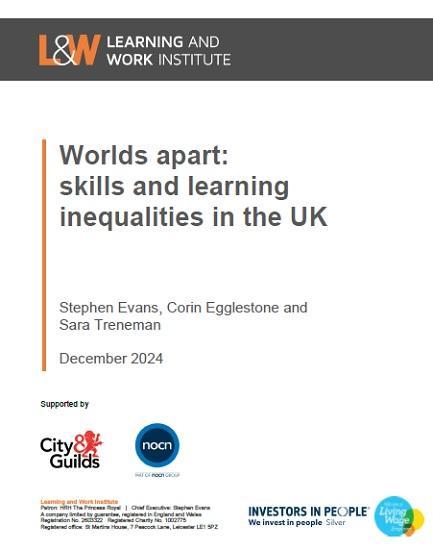Skills Inequalities Are Larger In The UK Than In Other Countries And Are Holding Back Growth, New Report Warns
8th January 2025

The UK has larger gaps in workforce skills between different parts of the country than most other European countries, finds new research from Learning and Work Institute (L&W).
The research shows that two thirds of adults in London have higher education qualifications, compared to just one third in Greater Lincolnshire. You are three times as likely to be qualified below GCSE level in the West Midlands (27%), the area with the worst qualification profile, than in West London (9%), the area with the best qualification profile.
These skills gaps are far wider than in neighbouring countries. Another 290,000 people, the equivalent of the population of Coventry, would have GCSE-equivalent qualifications in the West Midlands if the UK had lower inequality like in Denmark, France and Sweden.
L&W warns that, far from improving, the UK's postcode lottery in skills is on track to get worse over the next decade. While 71% of Londoners may have a higher education qualification by 2035, only 29% would in Hull and East Yorkshire. On these trends, the skills base in the capital and other parts of the south of England would match world-leading countries like Japan, South Korea and Canada. But skills in other parts of the UK, improving more slowly and from a lower base. risk falling further down international rankings and being overtaken by countries including Estonia, Latvia and New Zealand.
Closing the gap between London and the rest of the UK would require 4.1 million more people to gain higher education qualifications outside London. These findings therefore present a challenge for the Government: the missing 4 million graduates risk holding back economies outside London, given how skills are key for improving productivity, for business success, and for people's job and career opportunities.
The new report warns that improving skills in an area on its own will not be enough, however. Most areas already lose graduates to a small number of cities like London, Leeds, Bristol and Brighton; even with a step change in skills provision, people in low-skill areas who gain new qualifications may continue to follow the better-paid jobs into these areas. L&W argues that efforts to improve skills therefore need to be joined up with efforts to improve jobs and opportunities across the country.
The independent policy and research organisation's report is the second produced as part of its Ambition Skills project. This programme, supported by City & Guilds and NOCN, is looking at the UK’s skills base and how to improve it to grow the economy and widen opportunity.
The Government has said it will publish a post-16 skills strategy and provide more details of its planned Growth and Skills Levy, reforming the current apprenticeship levy paid by large employers, in early 2025. It has also asked local government and mayors across England to draw up growth strategies, and will hold a spending review in spring 2025.
L&W argues that all these efforts need to be joined up and have skills at their heart. Any new strategy will need to tackle the £1 billion cut in Government investment in skills in England since 2010 and the 26% fall in employer investment in training since 2005.
Stephen Evans, Chief Executive at Learning and Work Institute, said, "This report shows a tale of two countries, with the magnetic pull of London drawing in talent from around the country. This has created a skills chasm between areas and has become a self-reinforcing cycle, with employers more likely to create high skilled jobs in the south of England. To break out of this cycle, we must combine investment in jobs and infrastructure with more efforts to improve skills by the Government and employers. Otherwise, the Government’s ambitions for broad-based growth will fall flat.
Graham Hasting-Evans, Chief Executive of NOCN, said, "This is an excellent report which brings out the inequalities across the various parts of the UK. If we are to drive economic growth and social justice then we need an ambition to drive everyone’s skills up to international standards through an efficient skills system.
Read the report HERE
Pdf 27 Pages
